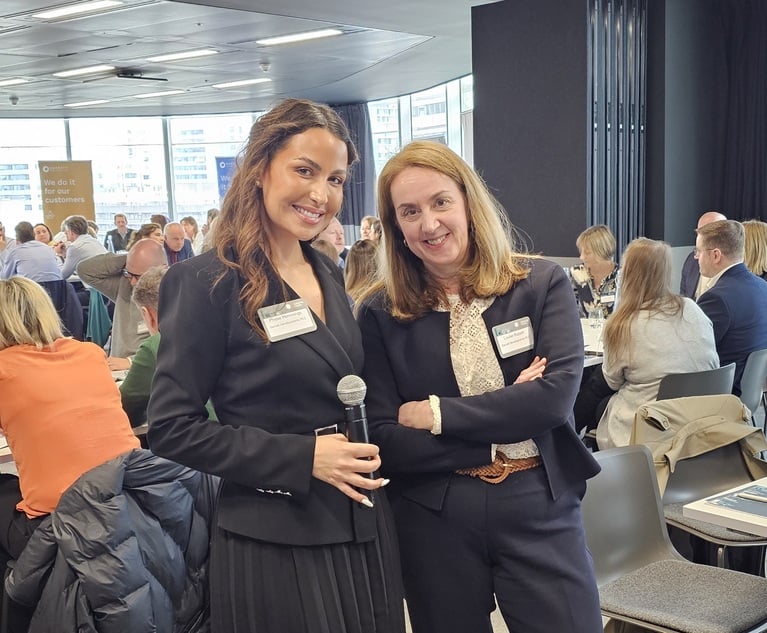Overworked corporate counsel cut back on use of outside firms
Corporations are using fewer law firms because short-staffed corporate legal departments have little time to manage outside firms, according to new research. The study, carried out by BTI Consulting Group, canvassed 550 companies with average revenues of £16bn and average annual legal spend of £12m.
July 20, 2009 at 10:01 AM
2 minute read
Corporations are using fewer law firms because short-staffed corporate legal departments have little time to manage outside firms, according to new research.
The study, carried out by BTI Consulting Group, canvassed 550 companies with average revenues of £16bn and average annual legal spend of £12m.
Companies surveyed said they expect to have on average two primary law firms by 2012, six secondary firms and 23 other firms they sometimes use. That compares with a 2008 average of two primary law firms, nine secondary firms and 32 other firms.
In 2007, the companies on average worked with two primary, 10 secondary and 40 other firms.
Corporations' efforts to trim their list of law firms, known as convergence, is a long-term trend, but in the current climate, money was not the only issue cited by companies.
BTI president Michael Rynowecer commented: "Corporate counsel are saying, 'I don't have time to be managing law firms; I just cut my staff by 20%.'"
Corporate counsel are also indicating a reluctance to work with firms that are not flexible in billing, staffing matters and communicating with the client, Rynowecer said. Companies' increasing demands for flexibility create opportunities for smaller firms, and BTI research shows the same companies making a marked migration to smaller firms.
According to the data, companies have fewer relationships with Am Law 100 and 200 firms – the US's top 200 revenue-producing firms, as ranked by The American Lawyer.
The research showed 36% of the firms the companies worked with in 2008 were Am Law 100 firms, 26% were Am Law 200 firms and 38% were outside the Am Law 200. In 2007, 64% of the firms the companies worked with were in the Am Law 100, 13% were in the Am Law 200 and 25% were outside the Am Law 200.
"If you put together the fact that companies are embracing smaller firms at same time they are reducing the number of law firms they are using, it is real, it has traction and clearly there is new behaviour," Rynowecer said.
This article first appeared in The National Law Journal, a US sister title of Legal Week.
This content has been archived. It is available through our partners, LexisNexis® and Bloomberg Law.
To view this content, please continue to their sites.
Not a Lexis Subscriber?
Subscribe Now
Not a Bloomberg Law Subscriber?
Subscribe Now
NOT FOR REPRINT
© 2024 ALM Global, LLC, All Rights Reserved. Request academic re-use from www.copyright.com. All other uses, submit a request to [email protected]. For more information visit Asset & Logo Licensing.
You Might Like
View All
Broadcom Hires From Nuclear Giant to Appoint French Legal Head

GCs Say They are Getting 'Edged Out' of UK Boardrooms

'I Won’t Name the Firm, But...'—Barratt Redrow's Legal Head on External Counsel Red Flags
Trending Stories
- 1Latest Class of Court Officers Sworn into Service in New York
- 2Kirkland's Daniel Lavon-Krein: Staying Ahead of Private Equity Consolidation
- 3Many Southeast Law Firms Planned New, Smaller Offices in 2024
- 4On the Move and After Hours: Goldberg Segalla, Faegre Drinker, Pashman Stein
- 5Recent FTC Cases Against Auto Dealers Suggest Regulators Are Keeping Foot on Accelerator
Who Got The Work
Michael G. Bongiorno, Andrew Scott Dulberg and Elizabeth E. Driscoll from Wilmer Cutler Pickering Hale and Dorr have stepped in to represent Symbotic Inc., an A.I.-enabled technology platform that focuses on increasing supply chain efficiency, and other defendants in a pending shareholder derivative lawsuit. The case, filed Oct. 2 in Massachusetts District Court by the Brown Law Firm on behalf of Stephen Austen, accuses certain officers and directors of misleading investors in regard to Symbotic's potential for margin growth by failing to disclose that the company was not equipped to timely deploy its systems or manage expenses through project delays. The case, assigned to U.S. District Judge Nathaniel M. Gorton, is 1:24-cv-12522, Austen v. Cohen et al.
Who Got The Work
Edmund Polubinski and Marie Killmond of Davis Polk & Wardwell have entered appearances for data platform software development company MongoDB and other defendants in a pending shareholder derivative lawsuit. The action, filed Oct. 7 in New York Southern District Court by the Brown Law Firm, accuses the company's directors and/or officers of falsely expressing confidence in the company’s restructuring of its sales incentive plan and downplaying the severity of decreases in its upfront commitments. The case is 1:24-cv-07594, Roy v. Ittycheria et al.
Who Got The Work
Amy O. Bruchs and Kurt F. Ellison of Michael Best & Friedrich have entered appearances for Epic Systems Corp. in a pending employment discrimination lawsuit. The suit was filed Sept. 7 in Wisconsin Western District Court by Levine Eisberner LLC and Siri & Glimstad on behalf of a project manager who claims that he was wrongfully terminated after applying for a religious exemption to the defendant's COVID-19 vaccine mandate. The case, assigned to U.S. Magistrate Judge Anita Marie Boor, is 3:24-cv-00630, Secker, Nathan v. Epic Systems Corporation.
Who Got The Work
David X. Sullivan, Thomas J. Finn and Gregory A. Hall from McCarter & English have entered appearances for Sunrun Installation Services in a pending civil rights lawsuit. The complaint was filed Sept. 4 in Connecticut District Court by attorney Robert M. Berke on behalf of former employee George Edward Steins, who was arrested and charged with employing an unregistered home improvement salesperson. The complaint alleges that had Sunrun informed the Connecticut Department of Consumer Protection that the plaintiff's employment had ended in 2017 and that he no longer held Sunrun's home improvement contractor license, he would not have been hit with charges, which were dismissed in May 2024. The case, assigned to U.S. District Judge Jeffrey A. Meyer, is 3:24-cv-01423, Steins v. Sunrun, Inc. et al.
Who Got The Work
Greenberg Traurig shareholder Joshua L. Raskin has entered an appearance for boohoo.com UK Ltd. in a pending patent infringement lawsuit. The suit, filed Sept. 3 in Texas Eastern District Court by Rozier Hardt McDonough on behalf of Alto Dynamics, asserts five patents related to an online shopping platform. The case, assigned to U.S. District Judge Rodney Gilstrap, is 2:24-cv-00719, Alto Dynamics, LLC v. boohoo.com UK Limited.
Featured Firms
Law Offices of Gary Martin Hays & Associates, P.C.
(470) 294-1674
Law Offices of Mark E. Salomone
(857) 444-6468
Smith & Hassler
(713) 739-1250








